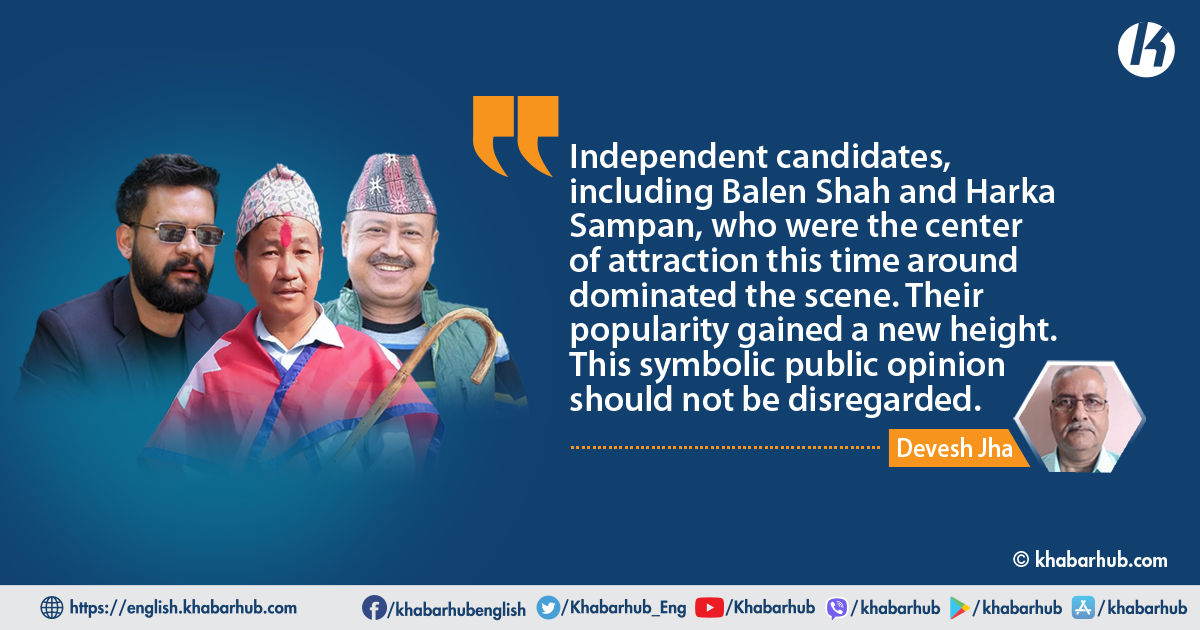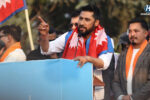Last week, the Chairman of the Maoist Center, Pushpa Kamal Dahal ‘Prachanda’ raised apprehension while saying that people have started to put the Maoist Center and other political parties in the same basket.
He continued to raise doubts about whether the image of the Maoist Center was gradually diminishing, and that people have undermined the Maoist party.
Prachanda also said that the distinction between the Maoists and other parties had been wiped out and that his party was no longer different from other parliamentary parties and what he said were “bourgeois opportunists”.
All political parties are conducting internal analysis to review the outcome of the recently-concluded local-level election.
In this process, the political parties are neither in a state of excitement, nor satisfaction.
Although different interpretations of the election results have been made, parties do not seem to be confident when it comes to public opinion.
Despite the claim that the Nepali Congress has emerged as the largest party, several of its leaders have had to see disappointing results from their wards or municipalities.
Public opinion is in a way a silent expression of divine judgment. Even if there is no alternative for these parties, for the time being, one cannot expect a miracle soon.
Meanwhile, although the CPN-UML has claimed that its party was performing well on the basis of the percentage of votes, the leaders seemed to be working hard for Left unity.
Those in the leadership, like the other parties, are disappointed with the outcome of their home constituencies.
For instance, the party suffered defeat from Chairman KP Oli’s own hometown Damak.
Madhav Kumar Nepal, who split the UML and formed a party under his leadership, felt rejected by the people despite holding some important ministries in the federal government and the provincial government.
Though the overall result of the Maoist Center seems to have improved relatively, the situation in Madhes was depressing.
The Maoists, who managed to get the leadership of 21 municipalities from the last local elections, have won 9 seats this time.
Meanwhile, the Madhes does not seem to have trusted Prachanda this time.
The Janata Samajwadi Party led by Baburam-Upendra seems to have suffered a major blow this time.
Baburam Bhattarai is in a depressing situation from his hometown in Gorkha’s Palungtar as he went against the spirit of the ruling coalition and formed an electoral alliance with the UML.
For Upendra Yadav, not being able to win from Biratnagar is a matter of serious political loss.
This is sure to have a far-reaching effect as the Janata Samajbadi Party has received a negative message from the party base.
Even the Democratic Socialist Party, which was formed after the split, does not seem to have achieved the expected results.
In the last election, LSP had the opportunity to lead 25 municipalities, but this time it has shrunk to 13 seats.
Meanwhile, CK Raut’s Janamat Party, which contested for the first time in Madhes-centric politics, failed to get the expected results.
The Janamat Party has stated that it got around 115,000 votes in the local elections.
Although Raut has earlier claimed that he would reach out to the people and has met around 2 million people, the result was unsatisfactory.
Instead, independent candidates were the center of attraction this time around, with Balen Sah from Kathmandu and Harka Sampang from Dharan gaining the opportunity to become popular.
Similarly, people also elected independent candidates from Janakpur and Dhangadhi.
Commenting on the results, the senior leader of the Unified Socialist party, Jhala Nath Khanal said that such instances could increase in the future. Likewise, Nepali Congress general secretary Gagan Thapa takes this as a challenge for the party.
Analyzing the local election results as a whole, the ideological deviation of the party should be considered as the main reason this time.
No major political party seems to have been able to keep its promise to the people.
In the last parliamentary elections, the UML and the Maoist Center had pledged party unification and a stable government, which could not be maintained due to the self-centered attitude of the leaders.
If the recent outcome of the local election is to be considered, the Nepali Congress has the most responsibility toward the people.
In the last parliamentary election too, Congress got the most popular votes.
However, unfortunately, corruption, familism and factional politics have been gradually influencing the party.
Meanwhile, UML Chairman and Leader of the main opposition party KP Oli, commenting on the government’s policy and programs in the parliament, seemed to be focused on reviving the agenda of nationalism and using the Chinese card in the upcoming election.
However, if the conflict between public opinion and organizational power escalates, the national political landscape will become even more chaotic.
Even Prachanda’s views are clear. Even if he represents the parliamentary system, he does not consider his party to be a parliamentary party.
He has clearly said he was forced to adopt the parliamentary system due to the political efforts of the Congress leadership.
If the opportunity arises, he would not hesitate to reverse the system.
It seems that the issues that have been forgotten for the last five years are about to be revived by the Madhes-centric leader.
Public opinion is in a way a silent expression of divine judgment. Even if there is no alternative for these parties, for the time being, one cannot expect a miracle soon.
Due to the strong influence and parties’ organizational situation, the party’s grip on society will be maintained.
The symbolic public opinion should be understood through local elections. It can be assumed that even if an independent candidate wins, he will not have a decisive position.
However, if the conflict between public opinion and organizational power escalates, the national political landscape will become even more chaotic.
Therefore, the political parties need to understand this reality and fulfill their parental responsibilities.
The lack of public interest in the current parliamentary process is enough to understand this.









Comment